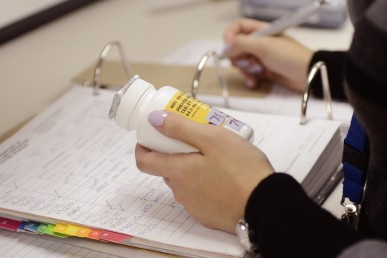UIC College of Pharmacy creates M.S. in comparative effectiveness research
The University of Illinois at Chicago College of Pharmacy has been selected as the 2015 Center of Excellence for Comparative Effectiveness Research (CER) Educational Program.

UIC will receive $250,000 over a three-year period to start a master’s of science degree with a specialization in comparative effectiveness research.
UIC joins the University of Washington, Johns Hopkins University, the University of Utah, the Harvard School of Public Health, and the University of Maryland as a CER center. The program is sponsored by the Pharmaceutical Research and Manufacturers of America Foundation.
Comparative effectiveness research examines treatment options for patients to see what works best for whom and under what circumstances. Studies compare drugs, medical devices, tests, surgeries, or ways to deliver health care.
UIC has significant experience in conducting comparative effectiveness research and patient-centered outcome research. It was the coordinating site for an AHRQ-funded (Agency for Healthcare Research and Quality) DEcIDE (Developing Evidence to Inform Decisions about Effectiveness) Center from 2005 to 2013 and housed a Center for Education and Research on Therapeutics from 2006 to 2014.
Glen Schumock, professor and head of pharmacy systems, outcomes and policy at UIC, and Simon Pickard, associate professor in that department, will serve as principal investigators of the new center.
Schumock says spending on health care in the U.S. exceeds that of all other countries, both in terms of total dollars and as a percent of gross domestic product. Expenditures were expected to increase more than 6 percent in 2014, reaching just over $3 billion, or 18.3 percent of GDP. By 2022, total U.S. health care expenditures are expected to reach $5 trillion.
“Although the U.S. spends more on health care and prescription drugs than other countries, data are mixed as to the value it gets for the money spent,” Schumock said. “For example, the U.S. ranks 26th among the 30 OECD (Organisation for Economic Co-operation and Development) countries in life expectancy.”
The lack of objective, scientifically derived data comparing treatment options makes decisions more complicated and less certain for patients, clinicians and policymakers, he said.
Pickard says that randomized, controlled trials have long been the “gold standard” for determining the efficacy of a medical intervention, but such studies often fail to provide the evidence needed to understand if it works in actual practice.
Comparative effectiveness research is a relatively new field, he said, and there is a “critical need” for new programs to educate and train new researchers.
“We’re excited to start offering this program,” Pickard said. “There are a variety of programs that grant degrees in related fields,” he said, including epidemiology, health economics, health services research and biostatistics. “But these programs do not cover the entire spectrum of methods and applications unique to comparative effectiveness research.”
